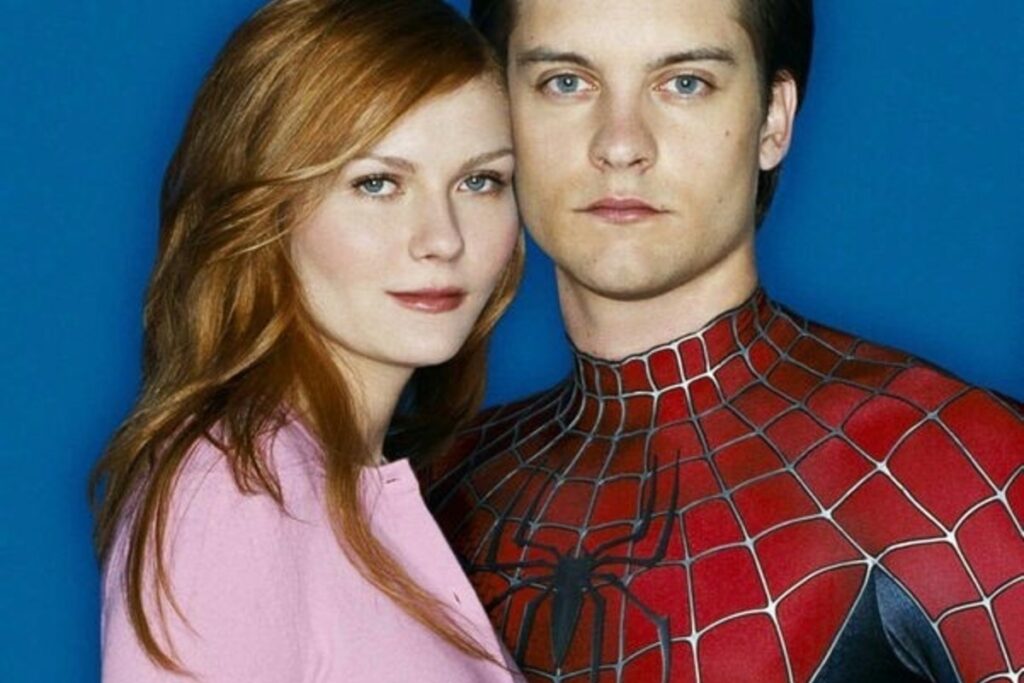The love story between Peter Parker and Mary Jane Watson is one of the emotional cores of Sam Raimi’s Spider-Man Trilogy. Over the course of Spider-Man (2002), Spider-Man 2 (2004), and Spider-Man 3 (2007), their relationship is tested repeatedly — not just by villains and danger, but by Peter’s secret life as Spider-Man. Let’s dive into the reasons why MJ leaves or distances herself from Peter in each of the three films.
Spider-Man (2002): Duty Over Desire
In the first film, Peter Parker is a shy, awkward teen with a crush on Mary Jane Watson, the girl next door. As the story unfolds, Peter becomes Spider-Man and starts battling villains like the Green Goblin (Norman Osborn).
Why MJ and Peter Don’t End Up Together:
At the end of the film, MJ finally confesses her love to Peter. However, Peter turns her down — not because he doesn’t love her, but because he fears for her safety.
🗨️ Peter Parker: “I will always be your friend. But only a friend.”
Peter chooses to hide his true feelings because he knows that his enemies could target her if they knew she was important to him — just like the Green Goblin tried to use her as leverage. MJ doesn’t exactly “leave” Peter here, but she walks away hurt and confused, not understanding the full weight of his decision.
Spider-Man 2 (2004): The Struggle of Secrets and Love
In Spider-Man 2, MJ is moving on. She’s now an actress and is dating astronaut John Jameson (the son of J. Jonah Jameson). Meanwhile, Peter’s double life is tearing him apart — he keeps missing her shows, forgets birthdays, and is always absent when she needs him.
Why MJ Leaves Peter Again:
Peter still loves her but continues to keep her at a distance for her own protection. MJ, feeling ignored and unloved, accepts John Jameson’s proposal. However, during the climax of the film, she finds out Peter is Spider-Man and realizes the sacrifices he’s made.
🗨️ MJ: “You do love me. You just won’t let it show.”
At the end, she leaves John at the altar and runs to Peter’s apartment.
🗨️ MJ: “Isn’t it time somebody saved your life?”
She finally chooses Peter, fully aware of the risks. So this time, she comes back — she doesn’t leave. In fact, it’s Peter who had been pushing her away, and she decides to fight for their love.
Spider-Man 3 (2007): Love Tested by Darkness and Ego
In Spider-Man 3, Peter’s life is finally going well. He plans to propose to MJ. But things spiral quickly:
- MJ is fired from her Broadway show.
- Peter becomes arrogant due to public praise as Spider-Man.
- Gwen Stacy is introduced, and Peter kisses her publicly, which hurts MJ.
- Peter becomes consumed by the alien symbiote, which turns him darker and more violent.
Why MJ Leaves Peter in Spider-Man 3:
Harry Osborn (now the New Goblin) manipulates MJ into breaking up with Peter, threatening to hurt him if she doesn’t.
🗨️ MJ: “There’s someone else. I’ve fallen in love with someone else.”
She says this in a forced breakup to protect Peter — echoing what Peter did to her in the first film. Ironically, now she’s the one protecting him by pretending to stop loving him.
Peter, under the influence of the black suit, lashes out at MJ emotionally and even physically (accidentally hitting her during a fight in a jazz club).
Eventually, Peter realizes his mistakes, removes the symbiote, and reconciles with Harry and MJ.
Final Scene:
The film ends on an ambiguous note. MJ is singing at a jazz bar. Peter walks in, and they share a silent, emotional embrace. There’s no clear dialogue, no formal reconciliation — but the scene suggests forgiveness and healing.
Final Thoughts: A Love Strained by Heroism
Mary Jane’s relationship with Peter Parker throughout the Raimi trilogy is shaped by one thing: Peter’s identity as Spider-Man.
- In Spider-Man 1, he pushes her away to protect her.
- In Spider-Man 2, she chooses him despite the risks.
- In Spider-Man 3, their love is broken by manipulation, ego, and violence — but the bond isn’t entirely lost.
Mary Jane never truly “leaves” Peter out of lack of love. Every time she distances herself, it’s either out of fear, misunderstanding, or self-sacrifice. Their story is tragic, human, and deeply tied to the emotional weight of being a hero.


